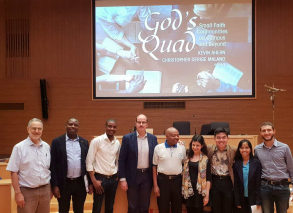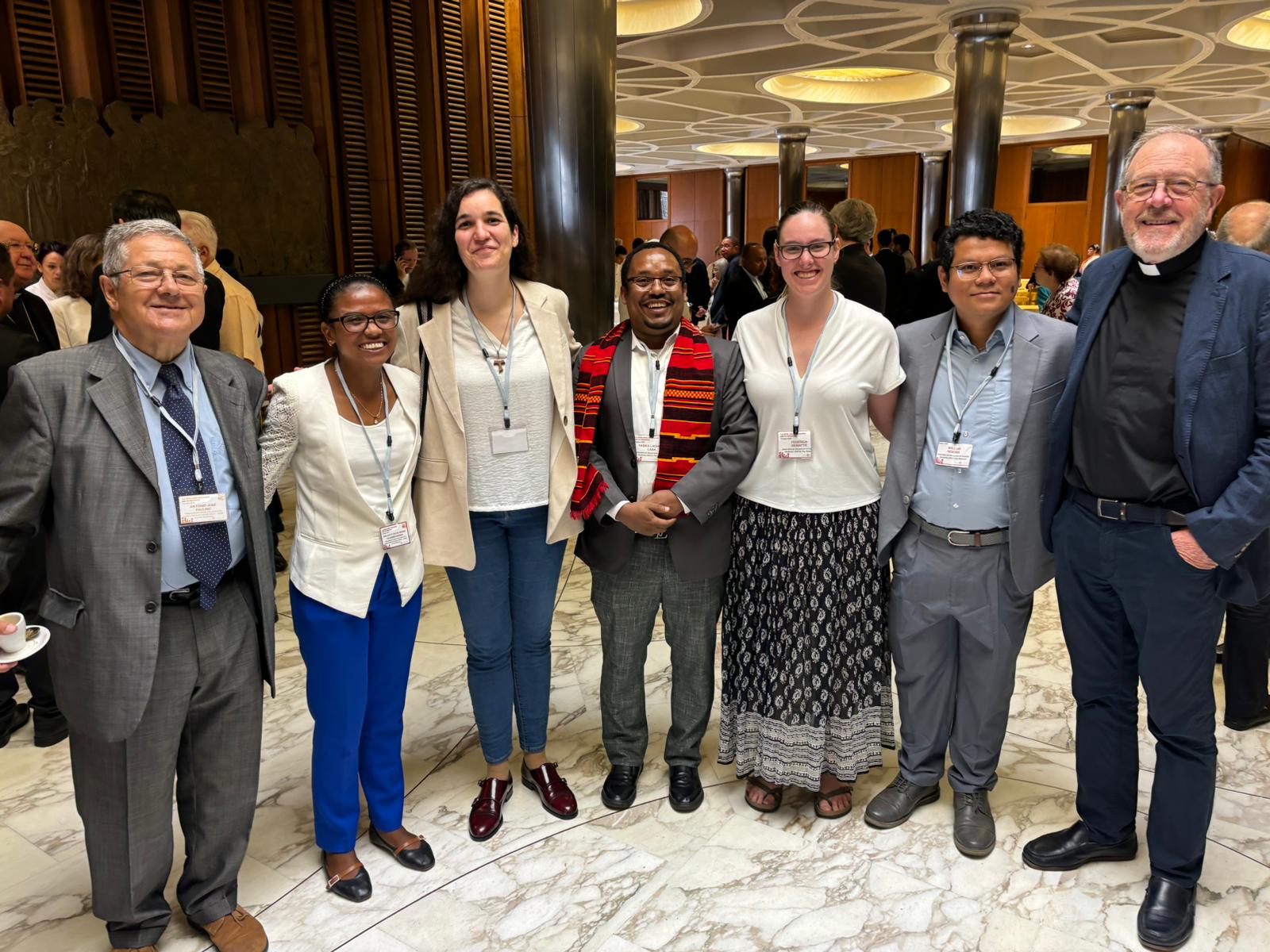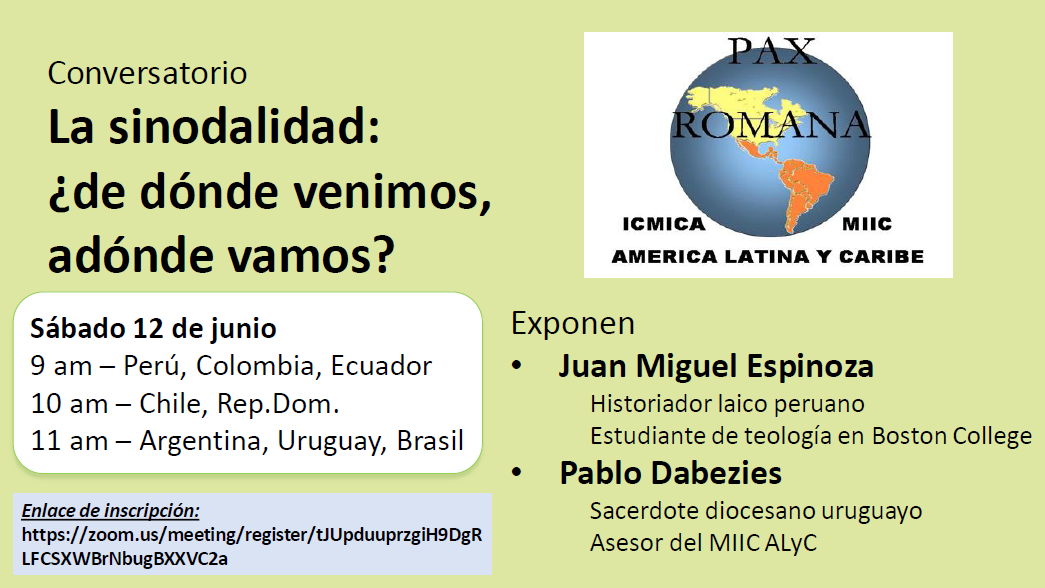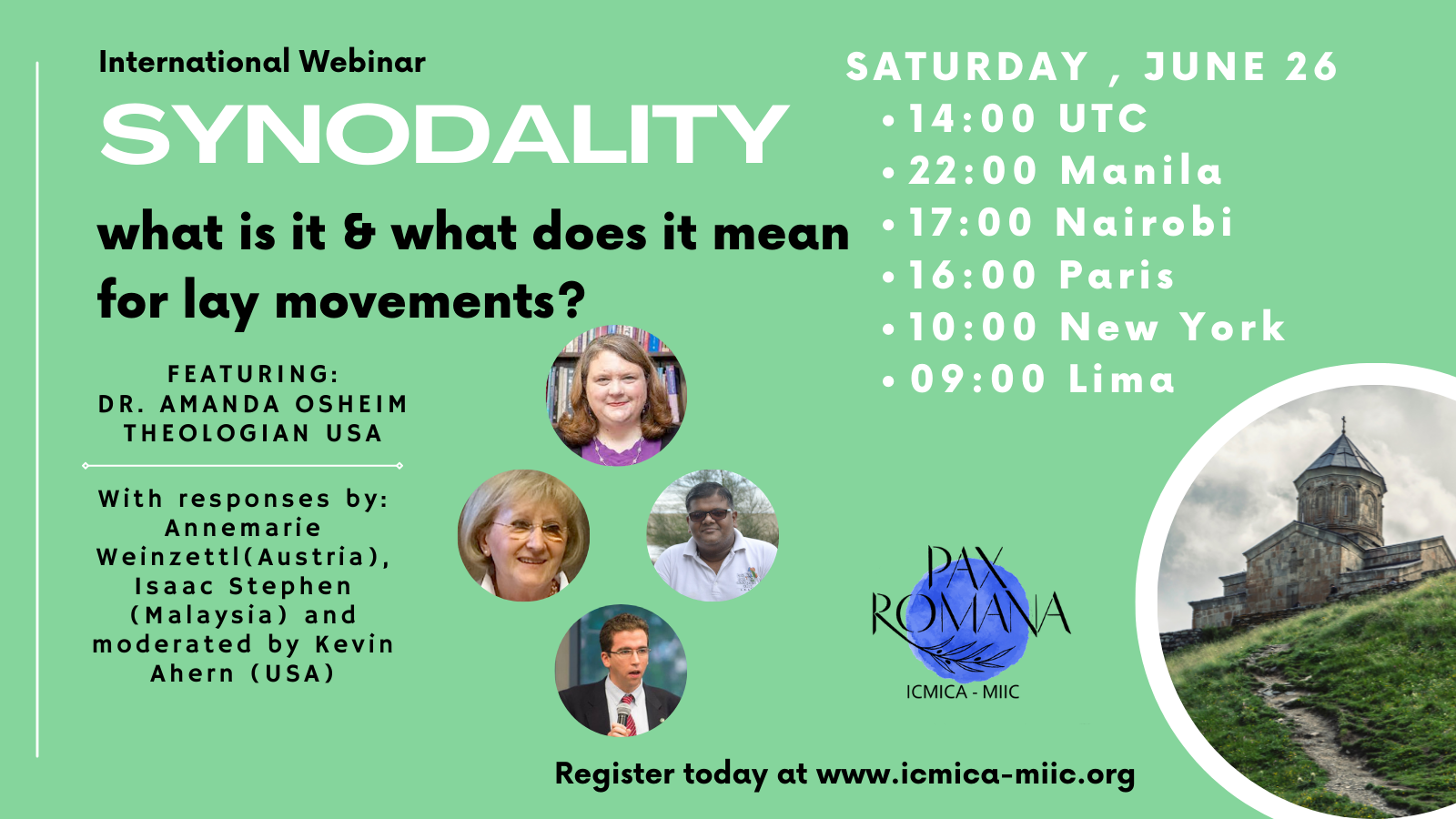 Statement to the members, auditors and observers of the 2018 Synod of Bishops on Young People, the Faith, and Vocational Discernment
Statement to the members, auditors and observers of the 2018 Synod of Bishops on Young People, the Faith, and Vocational Discernment
Over the past two years, we have been involved in an international research project to study and engage best practices in student and young adult apostolates.[1] We have collected good practices and models of small faith communities[2] of, for, and by Catholic university students from over a dozen countries. Some of these are highlighted in a book, God’s Quad: Small Faith Communities on Campus and Beyond (Orbis Books, 2018). Along with the book, we have held “listening sessions,” most recently in Nairobi, New York, and Rome. Our goal is to engage more voices of young people in the process of the Synod. From these events and our research, six key messages surface.
- 1) We encourage the church to use the final propositions and outcomes of this Synod to spark greater reflections, analysis, and pastoral renewal on the role of young people in the local church.
- 2) We invite the synod to reflect deeply on the need for a holistic and integrated approach to youth and young adult ministry and to attend to the dangers of neo-pelagianism and neo-gnosticism in young adult engagement.
- 3) A. We invite the synod to reflect seriously on how authentic and representative are young people that can be invited to participate in ecclesial decision making structures at the parish, diocesan, national, and curial levels; B. We invite all seminaries to involve young people in developing theological consortiums / seminary courses and/or theological workshops to train priests and lay leaders on how to effectively mentor and accompany young people and youth small Christian communities.
- 4) We invite each church structure to engage in a process of discernment to consider the pastoral and social needs of marginalized young people into their communities.
- 5) We invite more attention to be given to the power of the small communities in the life of the church. This includes highlighting good practices and the diversity of models.
- 6) We invite the Synod to pay more attention to the role played by youth-led youth and young-adult movements and associations to find ways to offer them support, including appointment of chaplains and financial support.
- Support for Pope Francis and the Synod’s Discernment Process
The students and young adults we have met have expressed support and excitement for the vision and direction which Pope Francis brings to the mission and ministry of the Church. We are grateful for the convocation of this special synod on young people and his insistence on the need for engaging the voices of young people in the process. The discernment method employed, including the launch of questionnaires, in the preparation for the Instrumentum Laboris is laudable. We lament that in many local churches, the processes to involve the voices of young people were limited, rushed, or not widespread. We believe there is still time to engage more young people. The process of discernment around the place and potential of young adult Catholics need not stop when the synod is concluded.
Recommendation 1: We encourage the church to use the final propositions and outcomes of this Synod to spark greater reflections, analysis, and pastoral renewal on the role of young people in the local church. The documents of this synod must not become dead texts as soon as they are published.
2 Student and Youth Ministry Must be Holistic and Integral
With Populorum progressio, Saint-to-be Paul VI – who himself served as a chaplain to FUCI, a student movement featured in our study – introduced the concept of integral human development to Catholic social doctrine. This in many ways must be the goal of the church’s ministry with young people. Too often however, ministry with young people is limited only to one dimension of evangelization. In some cases, the spiritual dimension gets lost while in others there is a real danger of a losing sight of the social demands of the Gospel and the presence of Christ in the marginalized. The dangers of both neo-pelagianism and neo-gnosticism as highlighted in Gaudete et Exultate are very real in among youth ministry and should be addressed by the synod. What is needed is a holistic and integral approach– one that considers the spiritual, social, personal, and ecological demands of evangelization (Instrumentum Laboris, 147).
Recommendation 2: We invite the synod to reflect deeply on the need for a holistic and integrated approach to youth and young adult ministry and to attend to the dangers of neo-pelagianism and neo-gnosticism in young adult engagement.
- Young People Are the Best Evangelizers to their Peers
A central theme from our research is the absolute need to enable young people, particularly school and university students, and young professionals, to see themselves as “full, conscious and active participants” (Sacrosanctum Concilium, 14) in the whole life of the church. Here, the words of the Second Vatican Council continue to offer profound wisdom: young people should be considered “the first apostles to the young, in direct contact with them, exercising the apostolate by themselves among themselves, taking account of their social environment” (Apostolicam Actuositatem, 12).
Pope Francis has often made this very same point calling young people to go beyond being mere “spectators” to becoming “real actors.” Young adults, he insists, must become “protagonists of contemporary events,” going out “into the streets” and “make a mess” of local churches.[3] In the international community, many texts of United Nations recognize the importance of youth participation as a key part of the 2030 Agenda for Sustainable Development. We hope this Synod will do this same.
In other words, the primary agents of student and youth ministry ought to be student themselves, even if this means allowing them to make mistakes. This is part of the genius of the vision of ministry proposed by Joseph Cardinal Cardijn and the movements of specialized Catholic action.[4] Empowering young people to be evangelizers to their peers is not easy as it is inhibited by real temptations to clericalism, ageism, and a type of spiritual consumerism where young adult become consumers and the ministers, a service provider.[5] This calls for rethinking the ways we accompany and mentor young people (Instrumentum Laboris, 130- 132; Pre-synod Statement, 10).
Recommendation 3a: We invite the synod to reflect seriously on how authentic and representative are young people that can be invited to participate in ecclesial decision making structures at the parish, diocesan, national, and curial levels;
Recommendation 3b: We invite all seminaries to involve young people in developing theological consortiums / seminary courses and/or theological workshops to train priests and lay leaders on how to effectively mentor and accompany young people and youth small Christian communities.
4. An Option for Marginalized Youth
This year we mark the 50th anniversary of the Medellin, meeting of CELAM in 1968. There and in later documents, including Puebla, the Latin American bishops reminded us of the evangelical priority to attend to the pastoral and real to make option for both the poor and the young. Young people are disproportionately marginalized by a range of social issues, including unemployment, human trafficking, HIV/AIDS, addiction, war, and forced displacement. The youth are far too often the discarded objects of the throw away culture and the globalization of indifference. Yet they also have an enormous potential to transform these situations as agents of evangelization. Targeted pastoral outreach to young people who are marginalized for whatever reason – socially, economically, culturally – must be an absolute concern of the church. This includes, but goes beyond the parish. Going out to the young where they are, particularly those at the margins, is not a waste of resources, as the statement of the pre-synod March meeting states (13). Here, careful attention must be paid that those young people with more economic resources, for example, students at an elite university, do not get more pastoral care than those who are economically marginalized.
Recommendation 4: We invite each church structure to engage in a process of discernment to consider the pastoral and social needs of marginalized young people into their communities.
- The Power of the Small Communities
We believe that small communities are the best ways to offer the empowering, integral and transformative outreach to students and young adults that is needed for the church. These includes many forms, including Small Christian Communities, Christian Life Community groups, Catholic clubs, small groups linked to the movements of Specialized Catholic Action, such as IMCS and IYCS, prayer groups, and lectionary based faith sharing communities. What is more encouraging, small communities can become vehicles for the discernment skills that Instrumentum Laboris (106) highlighted.
These experiences can go a long way to engender a sense of co-responsibility in the church (Instrumentum Laboris, 18); to offer spaces for young people to lead (Instrumentum Laboris, 33); to enable young people to go out beyond themselves (Instrumentum Laboris, 89).
The experience of small communities, in their many forms, enables students and young adults to experience a more authentic and relational sense of church (Instrumentum Laboris, 68-70). This can be particularly transformative for young people who feel at the margins of the church, including women, LGBT youth, and migrants.
Recommendation 5: We invite more attention to be given to the power of the small communities in the life of the church. This includes highlighting good practices and the diversity of models.
- The Value of National and Global Networks and Movements
Like any group, there is always a temptation for collective self-referentiality. Decades ago, Joseph Cardijn pointed this out in his vision for the Young Christian Worker movement. For much of same reasons that young people need to gather in small groups, these communities themselves need to gather into national and international networks and movements. For example, the International Movement of Catholic Students (IMCS Pax Romana) and International Young Catholic Students (IYCS) have gathered students into groups for community, evangelization, and social action nearly a century. Yet, the IMCS, IYCS, and other similar movements face practical challenges including difficulties in finding chaplains and finding funding for their projects. These movements and associations provide dynamic and global experiences of the church – as well as voices for young Catholics within the church and within civil society and the United Nations system.
Recommendation 6: We invite the Synod to pay more attention to the role played by youth-led youth and young-adult movements and associations to find ways to offer them support, including appointment of chaplains and financial support.
Affirmed: 01 October 2018, Rome
This statement is endorsed by the following international Catholic lay movements (associations of the faithful):
- The International Movement of Catholic Students (IMCS-Pax Romana)
- The International Catholic Movement for Intellectual and Cultural Affairs (ICMICA-Pax Romana) –
- The International Young Catholic Students
[1] This project has been organized in partnership with the International Movement of Catholic Students (IMCS-Pax Romana), the International Catholic Movement for Intellectual and Cultural Affairs (ICMICA-Pax Romana) and Orbis Books, the publishing arm of the Maryknoll Fathers and Brothers.
[2] The usage of “community” and “communities” is an intentional choice over the usage of the word group. Group suggests a transitory or task-oriented style, while community evokes a more relational and durable experience.
[3] “Pope’s Message to Gathering of European Scouts,” Zenit, 4 August 2014; “Pope Tells Young People Not to Be Affected by the Prevailing Opinion, but Remain Instead Steadfast to Their Christian Principles,” AsiaNews, 30 November, 2013; “Rebel Pope Urges Catholics to Shake up Dioceses,” The Word Post, July 25, 2013.
[4] These movements include: the International Young Christian Workers (JOCI), the International Coordination of Young Christian Workers (CIJOC), the International Movement of Catholic Students (IMCS-Pax Romana); the International Young Catholic Students (IYCS), the International Catholic Movement of Rural and Agricultural Youth (MIJARC), and the International Independent Christian Youth (JICI).
[5] See Kevin Ahern, “From Spectators to Protagonists: Youth Movements in a Global Church,” in Young Catholics: How They Think, How They Live, and How They Are Reshaping the Church, ed. Solange Lefebvre, Maria Clara Bingemer, and Silvia Scatena, Concilium, 2015/2 (London: SCM Press, 2015), 28–40.





Leave A Comment
You must be logged in to post a comment.